Do the rich buy expensive items simply because they can, or do they have practical uses in their daily lives, such as autos or houses?
It depends on the individual.
If I were to sum it up, I would say that people from the Qian family tend to buy high-quality items that can be passed down through generations. They don't care about brands, flashy or trendy things. They only care about the appearance and practicality of the items. And they often don't indulge in excessive consumption. (After all, that's the reason for their generational wealth. Although they are certainly not stingy, they just know the true value of things.)
The nouveau riche - especially celebrities and those who quickly became rich before poverty - often waste money on fashionable, flashy, and useless things other than showing off. (I'd like to mention here Johnny Depp's monthly expenses of $2 million.)
Those who have worked hard to become wealthy often value their money more than those who have acquired their wealth through luck. (Although, overall, both types of people behave like parvenus.)
However, everyone is different, and there are always some people who don't fit into these two norms, as well as some who are extreme in either direction.
Regardless of wealth, they are all human, just like everyone else.
Ronald Stephen Baron, the founder of Baron Capital, which manages over 45 billion dollars in billionaire, investor, philanthropist, informed his family to continue to hold Tesla stocks, regardless of its trend. Of course, it is better to buy on dips, have a planned and systematic approach, divide the investment into stages and batches, and ignore the influence of short-term and secondary trends. It would be even better to establish a long-term position.

What are the best and worst times to trade stocks?
The best times for stock trading are typically during the opening and closing hours of major stock exchanges, such as the New York Stock Exchange (NYSE) and the NASDAQ stock market. During these times, trading activity and liquidity usually increase, resulting in more favorable trading conditions. Specifically:
1. Opening hours (9:30 AM to 10:30 AM Eastern Time): The first trading hour after the market opens is known as the "opening bell." Trading volume and volatility are often high during this period, as traders react to overnight news and market developments.
2. Closing hours (3:00 PM to 4:00 PM Eastern Time): The last hour of trading before the market closes is known as the "closing bell." During this time, traders typically make final adjustments to their positions, leading to increased trading activity and potential opportunities.
On the other hand, the worst times for stock trading are usually periods of low trading volume and liquidity, which can result in widening spreads and increased slippage. These periods may include:
1. Lunchtime (12:00 PM to 2:00 PM Eastern Time in the USA): Trading activity often slows down in the middle of a trading day due to traders taking lunch breaks. This may lead to reduced liquidity and volatility.
2. After-hours trading (4:00 PM to 9:30 AM Eastern Time in the USA): After the market closes until the next day's opening, after-hours trading continues along with pre-market trading. Although these periods offer opportunities to trade outside regular market hours, the trading volume and liquidity are typically lower compared to normal trading hours, making it less favorable for certain traders.
When determining the best time for stock trading, traders must consider their trading strategy, risk tolerance, and goals. In addition, factors such as economic news releases, earnings reports, and geopolitical events may impact market conditions at any time.
"Best" is subjective because it depends on your goal. Assuming you want to make profits with low risk, in this case, I would say the period from about half an hour after the market opens to around lunchtime is the time when most stocks in the market see the highest profits and lowest risks.
Some people may disagree and say that the first half hour is the most profitable time to trade (at least if we're talking about the US market). However, although there is indeed significant volatility and trading volume during that time, it is precisely this volatility that makes trading extremely risky. For most traders, especially retail traders who do not work in bank trading halls and do not have high-speed connections to the exchange, powerful order processing systems, and the best data, the first twenty minutes to half an hour are too risky. Prices fluctuate rapidly. Trying to make profits during that time is almost like gambling. Overtrading can lead to mistakes. A sharp rise or fall is enough to wipe out the account.For most traders, especially retail traders who do not work in bank trading halls and do not have high-speed connections to the exchange, powerful order processing systems, and the best data, the first twenty minutes to half an hour are too risky. Prices fluctuate rapidly. Trying to make profits during that time is almost like gambling. Overtrading can lead to mistakes. A sharp rise or fall is enough to wipe out the account.,即不在银行交易大厅工作的零售交易者,他们没有与交易所的超高速连接、超强大的订单处理系统和最好的数据,前二十分钟到半个小时太危险了。价格在眨眼间上下波动。试图在那段时间获利几乎是赌博。过度操作可能会出错。一次飙升或下跌就足以让账户血本无归。
However, after the first twenty minutes to half an hour have passed, the pent-up energy from overnight has been released and the situation starts to stabilize. The overall direction of prices usually becomes clearer. With a good strategy and strict money management rules, a disciplined trader can make substantial profits during that time of the day. I say this because over the past few decades, I have been trading an average of two hours a day and living a decent life (making at least $1,000 in profits every day).
Once it's lunchtime, the market becomes quiet, and there tends to be fluctuations. Despite the emergence of automated trading, the majority of trading volume still comes from real people pressing real buttons to move funds in and out of the stock market. These people need to refuel, so unless there is major news to keep them at their desks, they will step away to fill their stomachs instead of making purchases. With the decrease in trading volume, the market becomes quiet.
Starting around 2 PM (again, I'm referring to the United States, but it is similar in most places around the world), everyone returns to their desks and gets back to work (with no pun intended). This is thehangoverphase, when those with pounding headaches look back at the morning charts and say,'What were we thinking?!'The significant volatility earlier in the day tends to reverse here as the more sober afternoon traders liquidate their positions.
As the closing bell approaches, the market becomes busy again as everyone tries to close their positions at the most favorable prices. We typically see a significant increase in trading volume during the last hour, making it the second best time for trading during the day.
As I mentioned above, all of this assumes that your goal is to achieve the highest profits with the lowest risk. If your goals are different for any reason, the answer would be different.
If your goal is to achieve maximum profit with minimum risk, then the best trading times in most stock markets are after the initial activity spike in the morning and before the lull during lunch time.
What haven't people told you about super billionaires?
My boss's net worth is between 1.5 and 0.2 billion US dollars, and most of his wealth comes from cryptocurrency and multiple businesses.
He owns Honda cars and motorcycles, and only has two houses, each worth between 0.2 million and 0.3 million US dollars. He is very knowledgeable about technology and always buys the latest Macbooks, upgrading his iPhone and Apple Watch every few years.
Apart from expensive cameras and computers, he doesn't have any luxury watches or expensive clothes. Apart from his accountant, shareholders, a few close friends, me (his secretary), and the tax officials who handle his annual taxes, no one knows how wealthy he is.
Despite not having luxury goods, my boss still buys a large number of items for investment purposes, such as stocks, cryptocurrency, mutual funds, etc.
Regarding the strategy,You can find the "News" feature under the "Market"-"More" section.Buy rumors, sell facts.

Disclaimer: Community is offered by Moomoo Technologies Inc. and is for educational purposes only.
Read more
Comment
Sign in to post a comment
